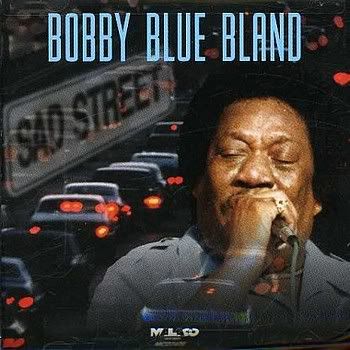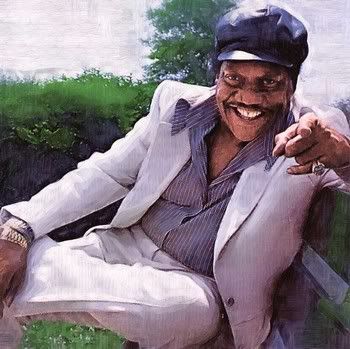
Bobby "Blue" Bland - Sad Street - 1995 - Malaco
Like Elvis Presley in the 1970s, when given the right song, Bland can still amaze you, remind you that the vitality of his voice, his artistry, is still there, still potent. That's exactly what he does on the title cut of his 1995 Malaco album Sad Street, a mostly disappointing hodgepodge of ready-made throwaways ("I Wanna Tell You About The Blues," "Mind Your Own Business," "Let's Have Some Fun") and covers both predictable ("God Bless The Child") and out of the blue (a suitably slinky take on Rod Stewart's "Tonight's the Night" that's much better than you might want to believe). "Sad Street," though, is a marvel -- utterly contemporary, politically charged like the finest call-to-arms soul of the '70s, yet steeped in the legacy of Bland's definitive work. Penned by the ace soul songwriter and ex-Ovations vocalist George Jackson, and musically powered by the veterans of Muscle Shoals soul, "Sad Street" surveys the violence and decay of America's inner cities without succumbing to cheap sentimentality or rose-colored nostalgia, and Bland sings the words like they've been eating at him too long, keeping him awake too many nights. He sounds weary, sick of what he's seeing but unsure of what to do about it, unable to shake the memory of when things didn't seem so bad -- when you could sit on the front porch without taking a bullet, when you could let the kids go outside and not worry about them coming back in a body bag. "The street that used to be filled with love, all you hear about now is blood," he groans, singing that last word like he's knee-deep in it, with ominous horns and eerie wah-wah guitar underpinning his sorrow and rage. It's a bone-chilling commentary, inseparably linked to Sly and the Family Stone's There's A Riot Goin' On, Curtis Mayfield's Superfly, War's "The World Is A Ghetto," and Stevie Wonder's "Living For The City." It's a different kind of sorrow and rage, though, for a man who's spent the last four decades essaying the pain and perils of romance and misery. But as "Sad Street" fades, with Bland facing the realization that he has to call that bleak, blood-soaked place home, the song takes its place next to the sad, desperate likes of "Lead Me On," driving home the fact that, emotionally or otherwise, Bobby Bland has never lived anywhere else. © John Floyd, © 1995-99 DesertNet, LLC
Bobby "Blue" Bland remains one of the great bluesmen. This album has received criticism in some quarters for being too slick, commercial, lush, twee, and overproduced. A lot of critics slated Bobby's version of Rod Stewart's "Tonight's the Night ", querying the use of this type of song on a blues album. It's a petty criticism, as the song is covered very well, and demonstrates the versality of Bobby Bland. You might even prefer it to Rod Stewart's version! All tracks are covered very well by Bobby, who has never sounded better, and a great back up band. The album is undoubtedly a departure from Bobby's tougher Beale Street/Memphis sound, but it's an enjoyable album, with a good song selection, and the man's vocals and all round talent cannot be faulted. A very good mid-nineties modern blues album, that may be "commercial", but never overly sentimental. The album was nominated for a 1997 Grammy Award for Best Contemporary Blues Album. Listen to his "The Soul of the Man" and "Foolin' with the Blues" albums
TRACKS / COMPOSERS
1 Double Trouble - Johnson, Mosley
2 Sad Street - Jackson
3 God Bless the Child - Herzog, Holiday
4 Tonight's the Night (Gonna Be Alright) - Stewart
5 My Heart's Been Broken Again - Jackson
6 I've Got a Twenty Room House - Johnson, Mosley
7 Mind Your Own Business - Johnson, Mosley
8 I Wanna Tell You About the Blues - Johnson, Mosley
9 I Had a Dream Last Night - Johnson, Mosley
10 Let's Have Some Fun - Johnson, Mosley
MUSICIANS
Bobby "Blue" Bland - Vocals
Will McFarlane, Jimmy Johnson - Guitar
David Hood - Bass
Clayton Ivey - Keyboards, Vibraphone
George Weaver - Drums
Roger Hawkins - Percussion, Drums
Alfredo Oliva, Geremy Miller, Stuart MacDonald, John DiPuccio, DeAnn Burger, Yang Xi - Violin
David Chappell, Debra Spring - Viola
Jim Horn - Flute, Sax (Baritone)
Harvey Thompson - Sax (Tenor)
Jim Williamson, Harrison Calloway - Trumpet
Charles Rose - Trombone
Rod Bland - Recorder
Quanda Brooks, Jewel Bass - Vocals (bckgr)
p/w if needed is aoofc

BIO
Bobby Bland earned his enduring blues superstar status the hard way: without a guitar, harmonica, or any other instrument to fall back upon. All Bland had to offer was his magnificent voice, a tremendously powerful instrument in his early heyday, injected with charisma and melisma to spare. Just ask his legion of female fans, who deemed him a sex symbol late into his career. For all his promise, Bland's musical career ignited slowly. He was a founding member of the Beale Streeters, the fabled Memphis aggregation that also included B.B. King and Johnny Ace. Singles for Chess in 1951 (produced by Sam Phillips) and Modern the next year bombed, but that didn't stop local DJ David Mattis from cutting Bland on a couple of 1952 singles for his fledgling Duke logo. Bland's tormented crying style was still pretty rough around the edges before he entered the Army in late 1952. But his progress upon his 1955 return was remarkable; with saxist Bill Harvey's band (featuring guitarist Roy Gaines and trumpeter Joe Scott) providing sizzling support, Bland's assured vocal on the swaggering "It's My Life Baby" sounds like the work of a new man. By now, Duke was headed by hard-boiled Houston entrepreneur Don Robey, who provided top-flight bands for his artists. Scott soon became Bland's mentor, patiently teaching him the intricacies of phrasing when singing sophisticated fare (by 1962, Bland was credibly crooning "Blue Moon," a long way from Beale Street).Most of Bland's savage Texas blues sides during the mid- to late '50s featured the slashing guitar of Clarence Hollimon, notably "I Smell Trouble," "I Don't Believe," "Don't Want No Woman," "You Got Me (Where You Want Me)," and the torrid "Loan a Helping Hand" and "Teach Me (How to Love You)." But the insistent guitar riffs guiding Bland's first national hit, 1957's driving "Farther Up the Road," were contributed by Pat Hare, another vicious picker who would eventually die in prison after murdering his girlfriend and a cop. Later, Wayne Bennett took over on guitar, his elegant fretwork prominent on Bland's Duke waxings throughout much of the '60s. The gospel underpinnings inherent to Bland's powerhouse delivery were never more apparent than on the 1958 outing "Little Boy Blue," a vocal tour de force that wrings every ounce of emotion out of the grinding ballad. Scott steered his charge into smoother material as the decade turned: the seminal mixtures of blues, R&B, and primordial soul on "I Pity the Fool," the Brook Benton-penned "I'll Take Care of You," and "Two Steps From the Blues" were tremendously influential to a legion of up-and-coming Southern soulsters.Scott's blazing brass arrangements upped the excitement ante on Bland's frantic rockers "Turn on Your Love Light" in 1961 and "Yield Not to Temptation" the next year. But the vocalist was learning his lessons so well that he sounded just as conversant on soulful R&B rhumbas (1963's "Call on Me") and polished ballads ("That's the Way Love Is," "Share Your Love With Me") as with an after-hours blues revival of T-Bone Walker's "Stormy Monday Blues" that proved a most unlikely pop hit for him in 1962. With "Ain't Nothing You Can Do," "Ain't Doing Too Bad," and "Poverty," Bland rolled through the mid-'60s, his superstar status diminishing not a whit. In 1973, Robey sold his labels to ABC Records, and Bland was part of the deal. Without Scott and his familiar surroundings to lean on, Bland's releases grew less consistent artistically, though His California Album in 1973 and Dreamer the next year boasted some nice moments (there was even an album's worth of country standards). The singer re-teamed with his old pal B.B. King for a couple of mid-'70s albums that broke no new ground but further heightened Bland's profile, while his solo work for MCA teetered closer and closer to MOR (Bland has often expressed his admiration for ultra-mellow pop singer Perry Como).Since the mid-'80s, Bland has recorded for Jackson, MS's Malaco Records. His pipes undeniably reflect the ravages of time, and those phlegm-flecked "snorts" he habitually emits become annoying in large doses. But Bobby "Blue" Bland endures as a blues superstar of the loftiest order, resurfacing in 1998 with Memphis Monday Morning. © Bill Dahl, allmusic.com





5 comments:
LINK
sexiest voice in the blues :) best version of a blues song ever imho the thrill is gone bb bland and bb king together again album with gloria howling in the middle of it :)
you doing better? big ole hug coming your way :)
Thanks Prin. You're an absolute star...XXX
I love it, thank you
Hi, Thea. Welcome back, and thanks for comment
Post a Comment